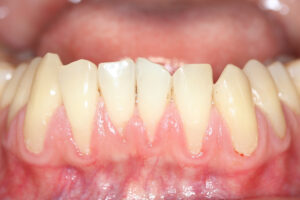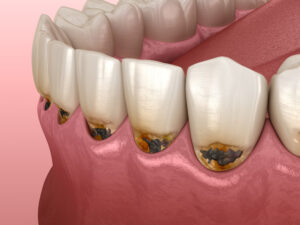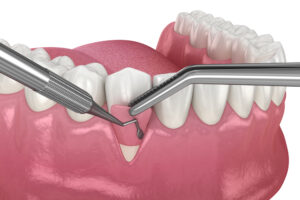Is Gum Recession Bad for my Dental Health?
 We get a surprising variety of responses from our patients when we inform them of gum recession. Some people freak out, assuming that gum recession makes someone automatically lose all of their teeth. Others react the opposite way, with zero concern, because they have always believed gum recession to be a natural part of aging. (Gum recession is the source of that old axiom “getting a little long in the tooth”.)
We get a surprising variety of responses from our patients when we inform them of gum recession. Some people freak out, assuming that gum recession makes someone automatically lose all of their teeth. Others react the opposite way, with zero concern, because they have always believed gum recession to be a natural part of aging. (Gum recession is the source of that old axiom “getting a little long in the tooth”.)
Well, we have good news and bad news. The good news is that gum recession is not an automatic death sentence for a tooth. The bad news is that gum recession is bad for your dental health. We’ll explain here.
What is Gum Recession?
Gum recession is a condition in which the gum tissues slowly withdraw along the roots of the teeth. In normal, healthy gum tissues, their position completely covers the roots of the teeth, allowing only the enamel-protected crown exposure in the mouth. With gum recession, the gums on the upper teeth pull upward, and the lower teeth pull downward, exposing those delicate roots.
Gum recession can have a variety of causes, and identifying the underlying cause is essential to successful treatment. Some people have more than one of the potential causes. These include active gum disease, heavy teeth clenching and/or grinding, inappropriate orthodontic movement, and improper toothbrushing technique. You can learn more about each of these specific causes of gum recession here.
What Dental Problems Can Gum Recession Cause?
While gum recession can be a relatively minor dental problem (as compared to active gum disease, tooth decay, and cracked tooth), it does put you at a much higher risk for various other dental problems. Some of these are annoying, and others are serious dental health risks.
Sensitive Teeth
The most common cause of sensitivity in the teeth is gum recession. This is because receding gums expose the roots of the teeth. Roots are not meant to be exposed to the oral cavity and all the thermal, chemical, and mechanical forces to which we commonly expose are teeth. Roots are supposed to be completely encircled in jawbone and covered with gums. The roots do not have enamel covering them. Without the protective insulation of enamel, the roots allow the sensation of hot and cold temperatures to reach the nerve within the tooth.
Tooth sensitivity can affect one tooth or all of your teeth. It can range from a minor twinge of discomfort when you take a sip of ice cold water to a sharp pain when you breathe in through your mouth on a cold day.
If you have sensitive teeth, you might have gum recession. Call today to schedule an evaluation with Dr. Ann or a professional teeth cleaning with our great dental hygienists. We can identify the areas of sensitivity and make recommendations for managing it conservatively.
Root Cavities
 Officially called root caries, cavities can occur on the roots of teeth. Because the roots do not have the protection of an enamel coating, it is actually much easier for them to get cavities. Roots begin with a very thin layer of a substance called cementum covering them. Unfortunately, the cementum doesn’t last long in the oral environment. We can brush it away or erode it with acidic drinks.
Officially called root caries, cavities can occur on the roots of teeth. Because the roots do not have the protection of an enamel coating, it is actually much easier for them to get cavities. Roots begin with a very thin layer of a substance called cementum covering them. Unfortunately, the cementum doesn’t last long in the oral environment. We can brush it away or erode it with acidic drinks.
For this reason, most exposed roots expose the core substance of the teeth, which is dentin. Dentin is yellower in color and softer than enamel. It consists of tiny tubules, or pores, that make it easier for bacteria to penetrate the tooth. Cavities on roots exposed by gum recession are very common, especially in a mouth that is dry and/or acidic.
Cavities on roots are also more difficult to treat. Dental materials are less predictable and successful on root structure, and it is trickier for your dentist to work on the roots of teeth. Cavities progress rapidly through the soft dentin and can quickly reach the nerve within, necessitating root canal treatment.
Unstable, Loose Teeth
Gum recession also indicates that there has been a loss of the attachment of supporting structures around a tooth or teeth. If you can see the roots, that means those teeth are not as stable as they should be. The stability of each tooth in the dental arch depends on two factors: 1) the support of the surrounding bone, ligaments, and gums, and 2) the configuration of the roots.
Some teeth can withstand some loss of support because they have multiple long roots that project outward. Others cannot stand to lose any support because the lone roots are short and conical. Gum recession is risky on these smaller cone-shaped roots, and unfortunately, this is most common on the incisors (your front teeth). If the recession worsens over time, the teeth will become loose and could even fall out.
What Can I Do about Gum Recession?
 There are a variety of ways to treat gum recession. Some aim to stop the progression of it and keep the gums where they are. Others use gum surgery to replace or reposition the lost gum tissue.
There are a variety of ways to treat gum recession. Some aim to stop the progression of it and keep the gums where they are. Others use gum surgery to replace or reposition the lost gum tissue.
Your dentist will help you identify the underlying cause or causes of your gum recession. Treating the cause is the only way to achieve success.
If you have active gum disease, then gum treatments are necessary, including deep cleanings and consistent follow-ups with your dental hygienist.
If you have an issue with nighttime clenching and/or grinding, Dr. Ann will prescribe a custom mouthguard for you to wear during sleep. This appliance separates the teeth and reduces the damaging forces placed on the teeth and gums.
For those who want to correct the gum recession, surgery is necessary. There are several types of surgery used to accomplish root coverage, including gum grafting and the Pinhole procedure. Talk to Dr. Ann to determine which treatment option will stop the gum recession and meet your long term goals for dental health.
More Questions about Gum Recession?
Call Designer Smiles today to schedule a consultation with Dr. Ann. She can answer any questions you have about gum recession, assess your specific situation, and help you select the best treatment option. Our goal is to help our patients keep all of their teeth in the healthiest state possible.
